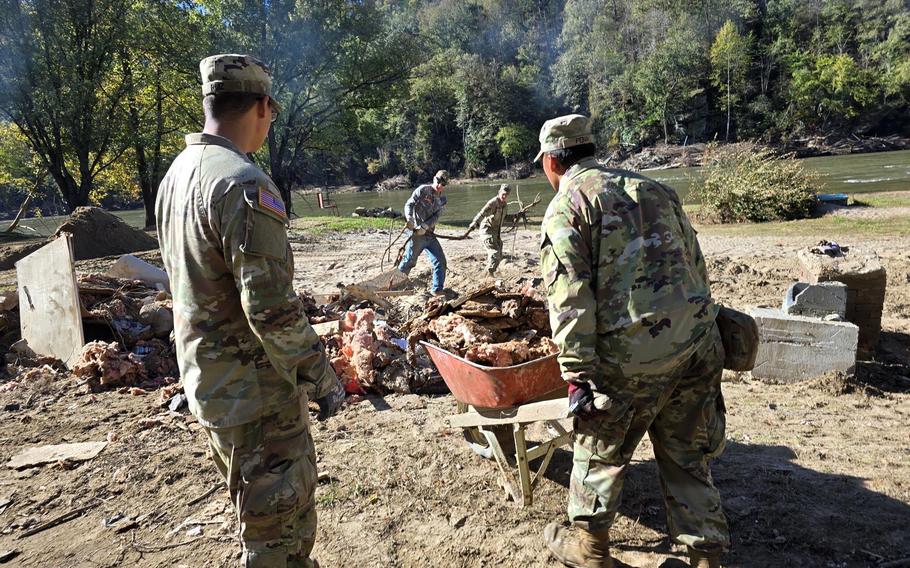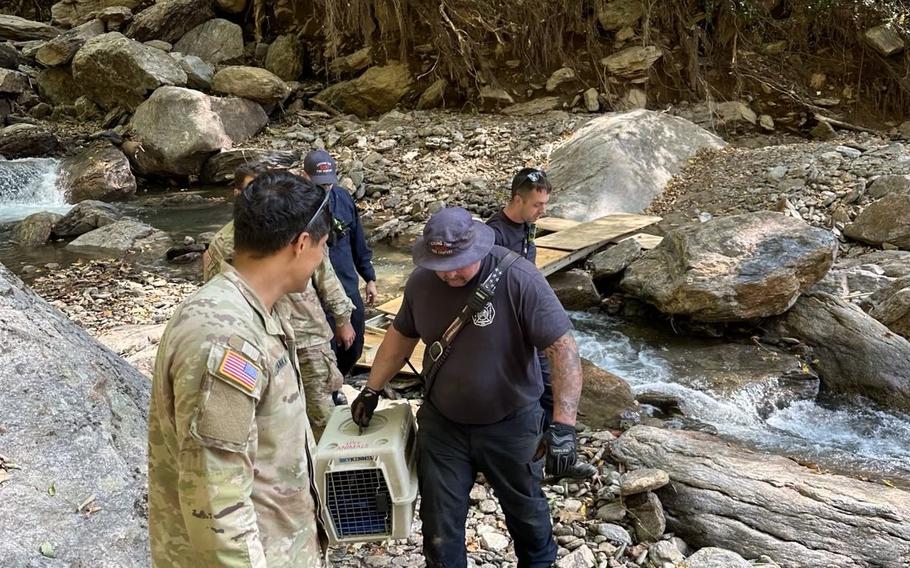
The Defense Department authorized up to 1,500 active-duty troops from Fort Liberty, N.C., and Fort Campbell, Ky., to help the Federal Emergency Management Agency and local officials get urgently needed resources to remote areas. (XVIII Airborne Corps)
Soldiers arrived a week ago in North Carolina to help with the recovery from Hurricane Helene and are still reaching locations where residents are waiting for the first influx of resources and support since the storm.
Col. Sean Shields, who is leading roughly 1,400 troops from a headquarters in the town of Marion, said many of the roads that wind through the mountains in the western part of the state and connect small communities and homes to larger towns are impassible or need clearing. Soldiers have also cleared mud and debris from buildings such as police departments, fire stations and other community resources to get them back operating.
“When you see the devastating effects of flood waters and fast moving, high-velocity landslides coming down narrow valleys and mountains, it’s incredibly devastating,” he said on a call Thursday.
The Defense Department authorized up to 1,500 active-duty troops from Fort Liberty, N.C., and Fort Campbell, Ky., to help the Federal Emergency Management Agency and local officials get urgently needed resources to remote areas. About 5,000 National Guard members from 17 states also are deployed across the entire southeast region as states from Florida to Virginia continue to recover from the Category 4 hurricane that made landfall Sept. 26.
More than 30,000 customers remained without power Friday in North Carolina, according to Duke Energy, the main electric provider in the state.
This is all in addition to work happening in Florida after a second storm, Hurricane Milton, made landfall as a Category 3 on Wednesday south of Tampa, causing massive flooding across the state’s peninsula.
Capt. Andrew Dutch of Fort Liberty has been leading a group of soldiers through areas including in Pensacola, N.C., west of where he grew up in Greensboro. They have spent about three days in each area getting to know residents and learning where to go to find neighbors in need or roads that still need clearing.

Staff Sgt. Abraham Camacho, other soldiers from Fort Liberty, N.C., and firefighters from Licking Township, Ohio, rescued two cats, BB and Ringo, on Oct. 8, 2024, from a home in Pensacola, N.C., where the owners had to leave the animals behind and evacuate by helicopter following Hurricane Helene. (82nd Airborne Division)
“[In Pensacola,] we were tied with the local fire department and a good group of volunteers that had a lot of supplies. They just struggled to get them out for people,” Dutch said.
Once they reach people who have been isolated since Helene’s rampage, he said they offer a menu of different foods and supplies to help sustain them until the power returns and the roads are safe. Since the temperature has begun to dip into the 30s and 40s at night, soldiers also are bringing blankets and other items to help residents stay warm.
“The life-sustaining stuff is now transitioning to heaters, propane, fuel to run generators, the more sustainable stuff,” Dutch said. “I think about it like, if you’re out in the woods and you’re trying to live. You get your food source and then you work on your shelter.”
On Tuesday, Dutch learned of a woman who had to be flown from her home by a helicopter after massive landslides took out the roads and even the back porch of her house. There wasn’t room in the helicopter for the woman’s two black cats, BB and Ringo, and she’d had to leave them behind.
Dutch sent out a team of soldiers with firefighters from Licking Township, Ohio, to find the cats. They navigated up a washed-out road with all-terrain vehicles and an infantry squad vehicle.
Staff Sgt. Abraham Camacho of Fort Liberty went on the mission and said they eventually had to create a bridge with a ladder and plywood where a creek now divided the road and hike a final half-mile to the woman’s house.
Camacho and a firefighter found the cats hiding in a bedroom and were able to get them into a carrier for the return trip. With two small dogs of his own at home, he said he could relate to what the cats’ owner must be feeling.
“I realize that these people have already lost a lot, it was awesome to get them reunited with their pets,” he said.
Shields said all the ruck marches and physical fitness training is paying off as soldiers must carry water, food and even cat carriers across rugged terrain.
They’ve also been using drones to fly over areas to see what is on the other side of impassable roads. In one instance, the drone operator saw an elderly man waving his arms at the drone and was able to get someone across to offer supplies to him.
The drone can also help soldiers know how to safely navigate across some areas.
“Those types of vignettes are happening all across the counties here because we are in a very mountainous region. It would be easier in a flat environment that’s based on a grid system, but in the mountains, communities are all over the place,” Shields said. “We’re just able to get into some other places that folks haven’t been or cannot get to.”
The work will continue, he said, until the immediate needs of communities have been met and the local authorities can manage themselves.
Dutch and Camacho said they’ve been humbled by the chance to do this work and see the immediate impact it has had on residents in North Carolina.
“It’s been probably one of the better life-changing missions I’ve been on,” said Camacho, who grew up in Sierra Vista, Ariz., but has spent time hiking in western North Carolina since his arriving at Fort Liberty. “We normally train to go to war but being able to deploy to your own country and help people in your same state, your neighbors, has been super gratifying.”